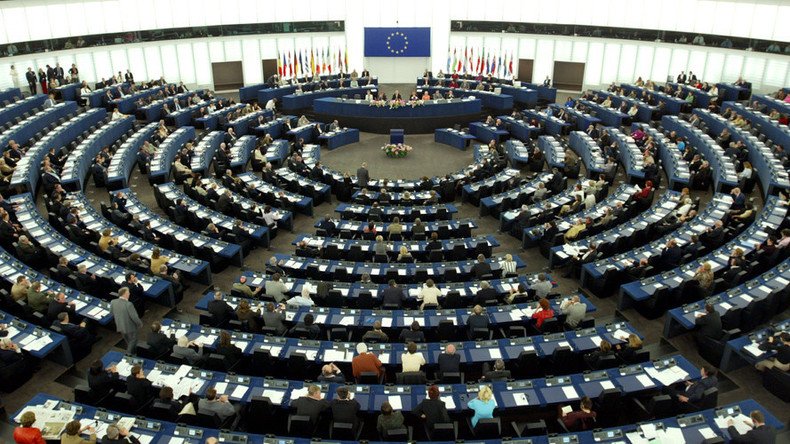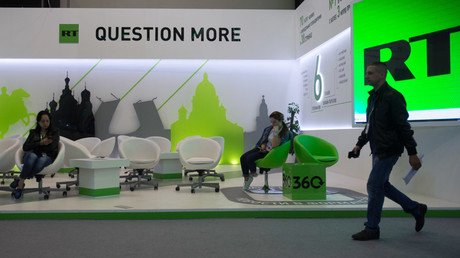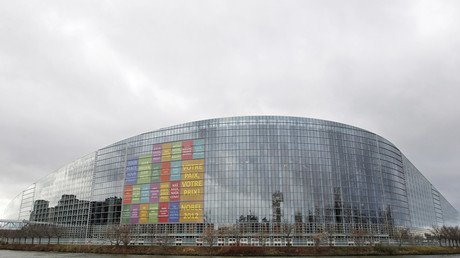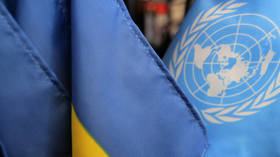EU votes for citizens to fund their own brainwashing

A fledgling group set up by the European Commission to allegedly counteract “Russian propaganda” is to be expanded with more public cash and resources. European citizens will be funding mechanisms inducing their own ignorance and misinformation.
This week, the European Parliament in Strasbourg voted by a dubious majority for a cash injection to expand the work of a media watchdog aimed at “debunking Russian propaganda.”
The little-known media group, reportedly comprising 11 “diplomats,” was established a year ago by the all-powerful, but unelected European Commission. The media unit has, therefore, no electoral mandate. It is potentially holding sway over how 500 million EU citizens will be able in the future to access news and public information.
In particular, it is evident the said EU media program is motivated by an extreme Russophobia bias. Working in tandem with this media watchdog is another coterie of seven parliamentarians headed by the rabidly anti-Russian Polish MEP Anna Fotyga. The 57-year-old member of the right-wing Alliance of Conservatives and Reformists in Europe within the EU Parliament has been regularly accusing Russia of “aggression” in Ukraine and toward Europe generally.
Fotyga’s self-appointed media group, dominated by eastern European anti-Russian interests, produced a report earlier this year entitled “EU strategic communications with a view to counteracting propaganda.” It makes for hysterical reading accusing Russian news networks RT and Sputnik of being Kremlin propaganda tools for sowing division and discord among EU member states.
The report states: “The Russian government is employing a wide range of tools and instruments, such as think-tanks [...], multilingual TV stations (e.g. Russia Today), pseudo-news agencies and multimedia services (e.g. Sputnik) [...], social media and internet trolls, to challenge democratic values, divide Europe, gather domestic support and create the perception of failed states in the EU’s eastern neighborhood.”
It was largely this tendentious “study” that formed the basis for the European Parliament’s resolution this week to expand funding for the media program to “debunk Russian propaganda.”
How much new money is being disbursed to the media watchdog is not clear. But ultimately it will be funded by EU citizens whose taxes underwrite member governments’ financial contributions to the Brussels-based 28-nation bloc.
Notably, the EU Parliament vote this week was far from convincing. Some 304 MEPs voted for extra funding to the “anti-Russian propaganda” group, while 179 MEPs voted against. A further 208 parliamentarians abstained. That suggests widespread apprehension among lawmakers about the function and credibility of “debunking Russian propaganda.”
So, here we have an outcome whereby a minuscule group of unelected faceless bureaucrats and ideologically driven politicians, who evidently have an ax to grind against Russia, are able to shape a vital area of foreign policy for the entire EU bloc and furthermore to significantly impinge on the public’s right to access information freely.
The charges of “Russian state-sponsored propaganda” have been inflamed with recent claims by Western leaders like US President Barack Obama and German Chancellor Angela Merkel that “fake news” is undermining Western democracy. These claims have in turn followed months of reports from various NATO-linked think-tanks which have allege that Russian news services are fronts for Kremlin-inspired disinformation.
Political pressure is now being brought to bear on internet and social media providers, such as Google and Facebook, to ban “fake news” from their networks. Germany’s Merkel has even declared this week that she intends introducing legislation that will force internet service companies to “regulate fake news.”
Europe enters new Dark Age with crackdown on Russia media (Op-Edge by Robert Bridge) https://t.co/NoZHsBgCfy
— RT (@RT_com) November 26, 2016
It is not clear how far this development will go. Western-based internet companies may yield and impose blanket censorship. Another question is what are the limits on designating which information and sources are considered “fake”?
The political atmosphere of Russophobia being whipped up by Western leaders, NATO-connected think-tanks and now EU parliamentarians – and the actual fingering of Russian news services like RT and Sputnik as “illegitimate sources” – is all setting the stage for the banning of Russian media.
In reports this week, the EU media watchdog that is being expanded to “counter Russian propaganda” said that it would be employing ways of “alerting internet users to false information.” Presumably, that involves hiring online commentators (trolls) who will add disparaging comments to news articles deemed to be Kremlin propaganda. Apparently, there are no moves yet to demand that internet providers actually delete content. But that full-blown censorship would seem to be only a short step away, given the relentless anti-Russian atmosphere and claims by Western leaders of “fake news” eroding democracy.
The insidious nature of what is unfolding is illustrated by the alleged incident of Belgian NATO fighter jets bombing Syria last month. On October 18, the village of Hassadjek in Aleppo was reportedly hit by air strikes that killed six civilians, according to local sources.
Several news services, including Reuters, subsequently carried reports in which Russia’s Ministry of Defense accused Belgium of carrying out the strikes as part of the US-led coalition purportedly bombing Syria to combat jihadi terror groups.
The Russian information appeared to be substantive, providing flight and radar data that reportedly identified the Belgian warplanes. Belgium’s ambassador was summoned in Moscow to explain why the Belgian government appeared to be stonewalling with denials that its air force was involved in the deadly attack.
Disturbingly, the news reports of the alleged Belgian air strike on the Aleppo countryside last month are described as an example of “fake news” by the EU media watchdog during this week’s parliamentary vote to endorse more funding for the unit.
This has huge sinister implications. Any news report or analysis – no matter how substantive or factual – that happens to offend the political sensibilities and reputation of EU governments are thus liable to be labeled “fake.” And therefore subject to censorship.
What about reports on Western governments supplying jihadi terror groups with weapons? Or reports on how Western media are colluding with terrorist propaganda fronts like the White Helmets to fabricate allegations of Russian violations in the liberation of besieged Syrian city Aleppo?
All such reports can be verified and documented. But because they happen to offend official Western claims about their involvement in Syria, then such “offending” reports can be merely dismissed as “Russian propaganda.”
This marks an audacious license by European and American authorities to grant themselves immunity from media criticism and scrutiny – simply by invoking a subjective, politicized claim that Russian news is “fake” and “propagandistic.”
Meanwhile, this week Ukrainian President Petro Poroshenko was being hosted in Brussels by EU leaders during which he warned: “The European Union is under very severe attack from Russia.”
There is no hint of awareness among European media outlets and the EU’s own media watchdogs that Poroshenko’s tedious tirades constitute a glaring case of “fake news.”
Dystopian future beckons in which EU citizens are obligated to fund unelected media controllers who will deprive them of critical news and information, while at the same time sluicing citizens with the most gratuitous anti-Russia propaganda.
The upshot is that EU citizens are gradually forced into paying for their own brainwashing.
No wonder a growing number of citizens are becoming alienated from the EU’s oligarchic rule. It is acting like a tyranny that needs to be torn asunder.
The statements, views and opinions expressed in this column are solely those of the author and do not necessarily represent those of RT.















